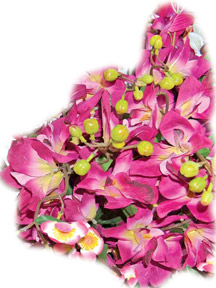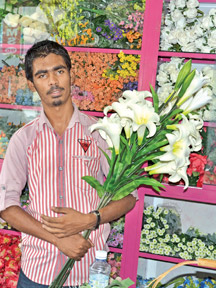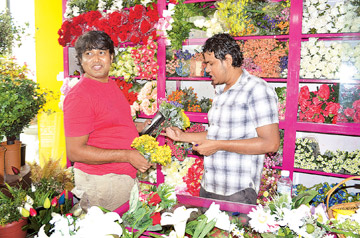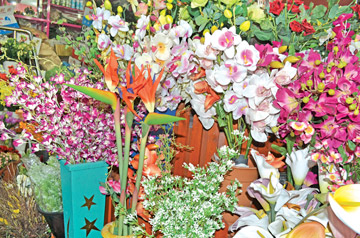Saying it with artificial flowers!
A group of foreign nationals who were on their way to Saman Devalaya
in Ratnapura suddenly spotted an elderly woman selling beautiful flowers
in a stall at Kosgama. They stopped the vehicle and inquired the flower
seller about the prices of flowers. As she couldn’t understand what the
English woman was saying, a trishaw driver who was nearby helped the
foreigner.
The foreigner said that they were going to Saman Devalaya and wanted
to buy some colourful flowers to offer. Although, the flowers cost about
Rs. 150, the foreign lady gave a Rs. 500. The foreign lady did not know
that the trishaw driver had cheated her by selling artificial plastic
flowers along with natural flowers that are generally used to offer in
temples.
Identifying flowers
This story reveals that it is difficult to identify locally made
artificial plastic flowers and natural flowers.
 |
|
Flower shop |
 Kosgama in the Avissawella area is famous for artificial flowers.
According to a longs-tanding artificial flower maker G.S. Gamini, the
livelihood of about 20 families in that area is manufacturing artificial
flowers. Kosgama in the Avissawella area is famous for artificial flowers.
According to a longs-tanding artificial flower maker G.S. Gamini, the
livelihood of about 20 families in that area is manufacturing artificial
flowers.
Out visit to Kapuwella village, three kilometres off Kosgama was
interesting. We met about 10 families whose livelihood was manufacturing
artificial flowers out of empty plastic bottles. People of all ages
between ten to 70 years are engaged in the industry.
59-year-old, Siri Madduma of Ihala Kosgama said they use only saline
bottles and other plastic bottles to manufacture flowers and other
items.
He said they are making not only plastic flowers, but also various
kinds of toys such as birds and animals out of plastic bottles.
We are not selling our products here, as we have buyers in Colombo,
he said.
He said importing various kinds of plastic flowers from China and
Bangkok has badly affected the local industry and he requests
authorities to minimise the imports of plastic flowers for the benefit
of at least 100,000 people whose livelihood is manufacturing plastic
flowers.
A longs-tanding artificial flower importer in Bankshall Street,
Colombo and the owner of ‘Flower Centre’, M. Hussain said it was their
family business.
According to Hussain, they started the business two decades ago and
they sell both locally manufactured artificial plastic flowers and also
imported flowers.
In our showroom, at least 80 percent are imported flowers. In
addition to flowers, we sell leaves, plants and trees and bouquets.
Hussain said he has given employment to many persons in his shop and
said his Flower Centre also provides gift items and ceramic vases.
He said he helps local craftsmen to sell their plastic flower
products in his showroom and encourage them to manufacture more and more
items.
While we were at the Flower Centre we spoke to several customers
about artificial flowers and many of them said they have been customers
of Flower Centre for that past 15 years.
 A long-standing buyer of artificial flowers, S. Manawadu highly
appreciated the service rendered by Flower Centre and said that he buys
various plastic flower items for special occasions. He said imported
flowers are in high quality than local plastic flowers and urged
authorities to introduce the Chinese technology to Sri Lankan craftsmen. A long-standing buyer of artificial flowers, S. Manawadu highly
appreciated the service rendered by Flower Centre and said that he buys
various plastic flower items for special occasions. He said imported
flowers are in high quality than local plastic flowers and urged
authorities to introduce the Chinese technology to Sri Lankan craftsmen.
The artificial flower selling business in our country has a long
history of over 500 years. The history reveals that even during the
colonial era the wives of British kings visited villages to see the art
of making artificial flowers by village craftsmen.
The flowers were manufactured out of green leaves, ekels and pieces
of clothes. Villagers were in the habit of picking flowers such as
Nelum, Olu and Manel from ponds and rivers and make similar artificial
flowers. The flowers were used to decorate palaces of kings.
The making of plastic flowers came thereafter.
Plastic flowers
A plastic flower maker Senarat Ambagahawatta of Pinnaduwa said he has
been in the industry for the past 25 years and distributing his products
to areas such as Anuradhapura, Polonnaruwa, Kandy and Kurunegala.
Artificial plastic flower seller, R. Sumanapala said he has been in the
business at Bambalapitiya, Dehiwala and Kollupitiya for the past 13
years.
“There are over 100 artificial plastic flower shops in Colombo and we
do not have a fixed monthly income, our daily income depends on the
number of customers visiting our stalls”.
He said he sells both locally made and imported flowers and many
people liked imported flowers.
A 56-year-old flower seller and a father of two, Y.R. Keerthisena who
sells artificial flowers at Bellanwila Temple premises said, during the
months of January, May, June and December he earns about Rs. 50,000 a
month by selling flowers to local and foreign nationals.
 |
|
Customers buying
flowers. |
 |
|
flowers |
A 38-year-old mother of three children Ramani Dayalatha of Pillaawa
at Boralesgamuwa said she has been in the locally made artificial
plastic flower selling business for the past 15 years and earns about
Rs. 15,000 a month.
She said the Pillaawa Temple at Boralegamuwa has become popular among
schoolchildren, since many of them come here during GCE (O/L), (A/L)
examinations and Grade Five scholarship periods to make vows for their
examinations.
Therefore in addition to plastic flowers, we also make plastic
garlands.
I also provide plastic garlands to several boutiques near Hindu
kovils in Colombo and Kandy.
“There are 27 flower stalls at Pillaawa and we have only one toilet.
I appeal the Divisional Secretariat to consider our pathetic situation
and construct another toilet and a wash room,’ a plastic flower shop
owner Sirisena Gamage said.
She said unlike in the past, generally the locally made plastic
flower selling business is running at a loss because of the arrival of
more beautiful plastic flowers from China, and I appeal authorities to
reduce the flower imports to safeguard local craftsman.
According to a long-standing flower seller Gunapala Peris at Kosgama,
the authorities should give a helping hand to plastic flower
manufacturers. Another plastic flower seller, Gunapala said in addition
to flowers he sells clay pots, garlands, coconut oil lamps, pooja
(offerings) baskets etc.
Gunapala also said generally plastic flower sellers get a good income
during Vesak, Poson, Duruthu and Bak Full Moon Poya days, but due to the
selling of imported flowers most flower sellers face immense hardships.
Gunapala also blamed several politicians including Ministers who are
responsible for safeguarding the country’s traditional industries, for
not taking any interest to develop not only the plastic flower industry,
but also many other small industries.
“If they have a real interest to protect our traditional industries,
they should at least minimise the imports; then they can uplift the
industry.”
A flower seller Sunil Gamini at Boralesgamuwa requested the
authorities to help artificial flower sellers to construct houses
through Bank loans. “As we generate only little monthly income and there
is no recognition to our traditional business, no bank gives housing
loans to us.
He also recalled how former President Ranasinghe Premadasa visited
their stall one night and discussed the grievances of both artificial
and natural flower sellers. He also helped many of us to construct
houses, but unfortunately he passed away.
He said the former President also wanted to give lands to needy
flower sellers.
AK
|


